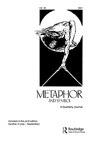论事件转喻的一些语用效果
IF 3.3
3区 文学
0 LANGUAGE & LINGUISTICS
引用次数: 0
摘要
摘要在文献中,事件转喻被用来解释语言使用者如何产生和解释话语,其中某些事件是根据其子事件或其所属的整体/复杂事件来理解的。本文试图讨论事件转喻的一些语用效果,据我们所知,这些语用效果迄今尚未被探索。第一节讨论了在真实的交际术语中,基于子事件对事件转喻的某些表达如何被视为其他表达的同义词。因此,我们展示了一个健全的同义词理论如何不仅受益于指称转喻的结合,而且受益于子事件对事件转喻的结合。第二部分重点讨论了EVENTFOR SUB-EVENT映射如何被证明有助于实现某些语用相关性和缓解/委婉的语境效果,而这些效果在文献中从未描述过。为了做到这一点,我们分析了60多个表达方式的集合(从对两位英语母语人士的研究中获得),以观察它们如何符合事件转喻的资格。本文章由计算机程序翻译,如有差异,请以英文原文为准。
On Some Pragmatic Effects of Event Metonymies
ABSTRACT In the literature, event metonymies have been used to explain how language users produce and interpret utterances in which certain events are understood in terms of their sub-events or the overall/complex events they are a part of. This paper attempts to discuss some pragmatic effects of event metonymies which, to the best of our knowledge, have not been explored to date. The first section deals with how certain expressions based on SUB-EVENT FOR EVENT metonymies can be considered synonymous for others in real communicative terms. We, therefore, show how a sound theory of synonymy could not only benefit from the incorporation of referential metonymies but also from the inclusion of SUB-EVENT FOR EVENT metonymies. The second section focuses on how EVENT FOR SUB-EVENT mappings have proven useful to achieve certain pragmatic relevance and mitigation/euphemistic contextual effects which have never been described in the literature. In order to do so, we analyzed a collection of more than 60 expressions (obtained from a study with two native speakers of English) to observe how they can qualify as event metonymies.
求助全文
通过发布文献求助,成功后即可免费获取论文全文。
去求助
来源期刊

Metaphor and Symbol
Multiple-
CiteScore
2.90
自引率
0.00%
发文量
23
期刊介绍:
Metaphor and Symbol: A Quarterly Journal is an innovative, multidisciplinary journal dedicated to the study of metaphor and other figurative devices in language (e.g., metonymy, irony) and other expressive forms (e.g., gesture and bodily actions, artworks, music, multimodal media). The journal is interested in original, empirical, and theoretical research that incorporates psychological experimental studies, linguistic and corpus linguistic studies, cross-cultural/linguistic comparisons, computational modeling, philosophical analyzes, and literary/artistic interpretations. A common theme connecting published work in the journal is the examination of the interface of figurative language and expression with cognitive, bodily, and cultural experience; hence, the journal''s international editorial board is composed of scholars and experts in the fields of psychology, linguistics, philosophy, computer science, literature, and media studies.
 求助内容:
求助内容: 应助结果提醒方式:
应助结果提醒方式:


